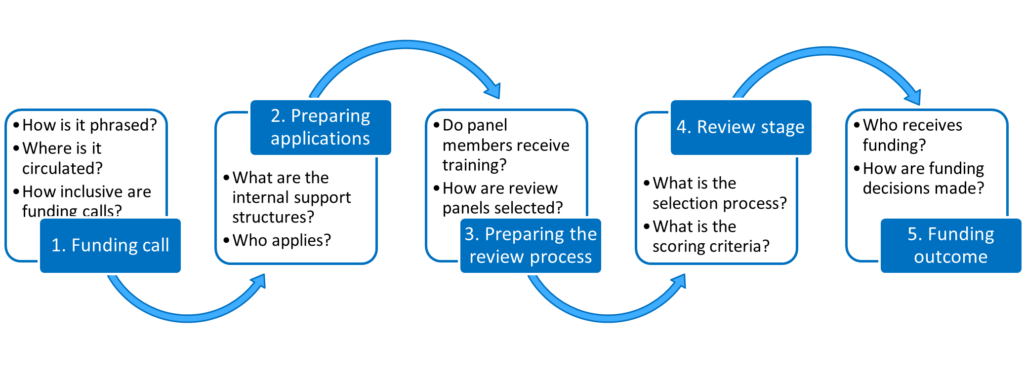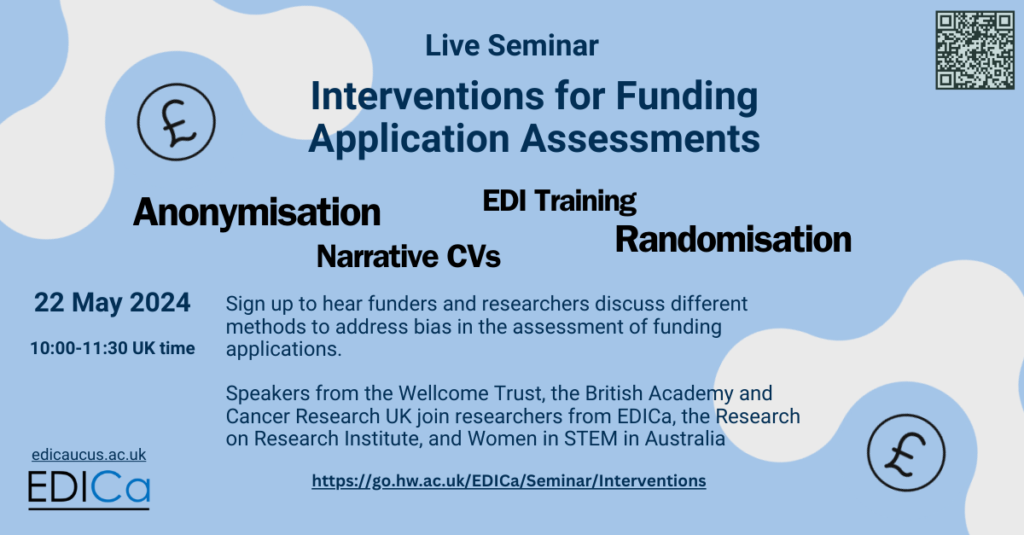Peer review bias in the funding process
EDICa publishes an evidence review examining recent literature on what reduces bias in the peer review process.
Published : 04/04/2024
Home » Peer Review Bias in Funding
With attempts to make academic promotion and hiring more equitable and diverse, greater focus is being placed on metrics and what feeds into those decisions. Increasingly, funders are under pressure to review who is being funded and from what institutions, and how those funding decisions are made. EDICa undertook an evidence review looking at peer reviewed literature published in the last ten years on the peer review process for funding in academia.
Our findings are organised by the five stages of the funding process. Bias impacts the funding process at each stage.

5 stages of the funding process
While 44% of the literature reviewed focused on gender bias in the peer review process — half of which were from STEM subjects — only 18% concentrated on racial inequity. Groups of scholars affected by bias in the funding process are women, early career researchers, disabled researchers, racially minoritised researchers, and researchers from less prestigious institutions. The literature that documents obstacles for women, early career and ethnic minority researchers is relatively rich. Women’s experiences as applicants as well as the impact of their increasing inclusion as reviewers and assessors has been discussed across all stages of the funding process. Obstacles for early career and ethnic minority researchers as applicants, as well as calls for their inclusion as reviewers, were also found, but to a much lesser extent. We found very little evidence for experiences of disabled researchers and no accounts for any of the other protected characteristics of the Equality Act (2010).
EDICa also reviewed 25 websites with links to publicly available handbooks, guidance notes for peer reviewers and panel chairs, and unconscious bias briefings. We studied published UKRI diversity data between 2014 and 2021 and examined action plans from respective research councils for EDI interventions.
We found that there is little evaluation of the interventions that funding councils employed to counter biases, the reasoning behind them or their impact. Funders often rely on scholars’ readiness to objectively evaluate their own bias and willingness to be objective.
All councils plan to play active roles in changing the funding process to make it more equitable, which is a positive finding. The initiatives are in their early stages and still require testing and refining. The collection and annual publication of EDI data on who receives funding from UKRI councils in response to calls for more transparency, only offers a partial picture of experiences in the funding process. Looking beyond established categories and investigating what data has so far been overlooked is a crucial first step to make the funding process truly inclusive.
Most research focuses on the final stages of the funding process. There are large gaps in evidence for processes that precede the submission of a funding bid, including multiple factors that enable applicants to prepare a bid for large grants – like professional networking and internal funding bid review processes, also known as demand management.
Our evidence review is a work in progress and we will add new evidence and results as the EDICa project continues and seeks to co-design interventions that remove barriers outlined in this review.
We encourage reading of our full report, which is 27 pages of text plus references and appendices. The report is open access and can be downloaded here.

Seminar on Peer Review
To continue the conversation on peer review processes in academia, EDICa hosted two seminars. These were recorded and published on our website.

Seminar on Interventions for Assessments
Watch our panel of funders and researchers discussing different types of alternative methods of assessing funding applications.
Other related resources
EDICa hosts a regular blog and seminars, as well as collecting a library of resources of equality, diversity & inclusion practices in research & innovation.

Menstrual Health at Work Seminar Recording
Date: 22ndFebruary 2024
A recording of EDICa’s panel discussion on menstrual health at work.

Report on recommendations for improving support for managing menstrual health
Date: 10th June 2024
Report
Report on “Recommendations for improving support for researchers
managing menstrual health”

Do deaf women feel safe on campus? A qualitative case study of one UK university
Date: January 2021
An article reporting on 5 interviews of deaf women working or studying on a UK campus about their feelings of safety.




































